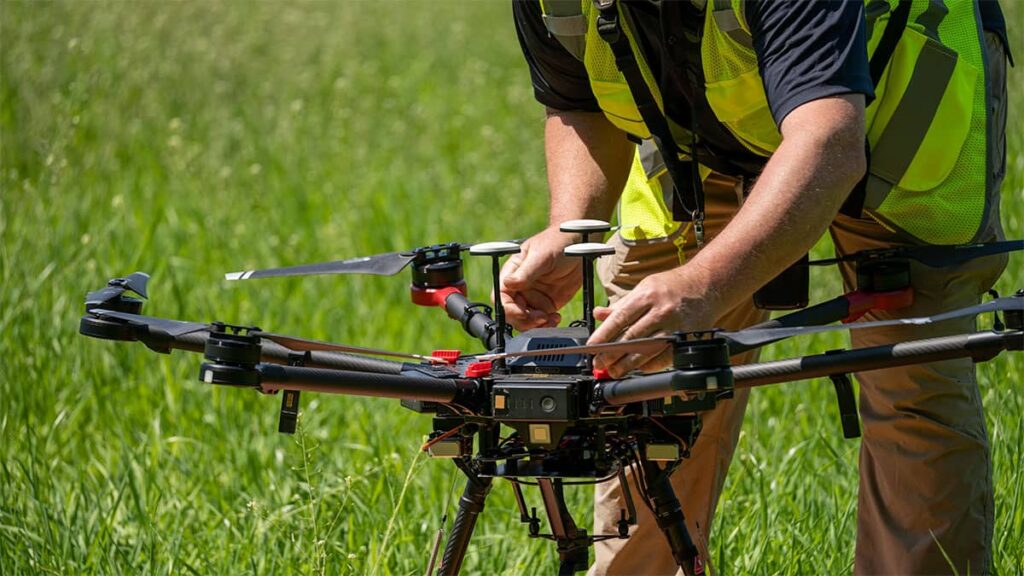Choosing Which Drone Services You Should Offer: What I Wish I Knew, Part 3
Editor’s note: “Choosing Which Drone Services You Should Offer” is the third and final in a series: What I Wish I Knew When First Becoming a Commercial Drone Pilot.
Here, commercial pilot & author David Daly explains what the gift of hindsight has taught him over the years.
If you’re planning on getting started as a commercial drone pilot, you probably have a lot of questions and concerns. There’s training to consider, deciding on which equipment to buy, and of course, deciding which drone services you should offer.
It’s certainly a lot to think about.
I know; I’ve been in your shoes and struggled to find the same answers.
And, it’s just like the saying goes: Hindsight is 20/20. When drone pilots look back on the start of their careers, we probably all have things we wish we did differently.
In this third part of our What I Wish I Knew series, I’d like to discuss how to choose the types of drone services you should offer, why, and how to make the most of them.
Even if you already have an established drone operation, there’s always room for expansion or exploring offering additional drone services.
Hopefully, the lessons I’ve learned along the way will help you make the right choices for you and your business.
How to Select Which Drone Services You Should Offer
When I became a commercial drone pilot in 2017, I wanted to do everything. Since many industries were starting to explore the use of UAV technology, I felt it was the perfect time to jump in.
And so, when I started my drone service company, I offered every service I could think of. Real estate photography, mapping, thermal inspections, precision agriculture, construction, mining, editing, and more were all on my list of offered drone services.
But, I quickly realized that when choosing which commercial drone services you should offer, ‘the more, the merrier’ doesn’t apply.
First, I discovered that half of the services I offered weren’t needed. Or, if they were needed, they were better suited for others.
Second, as the industry was rapidly growing, I offered too much for any one person to develop expertise in them all.
For example, the limited knowledge I had on performing thermal inspections in 2017 was adequate when I started. However, only a few years later, it was no longer enough. Sure, I had learned more about it along the way, but not as much as others had.
I simply spread myself a bit too thin.
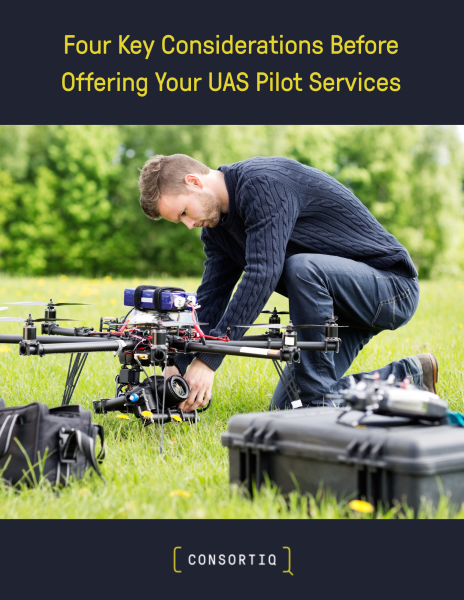
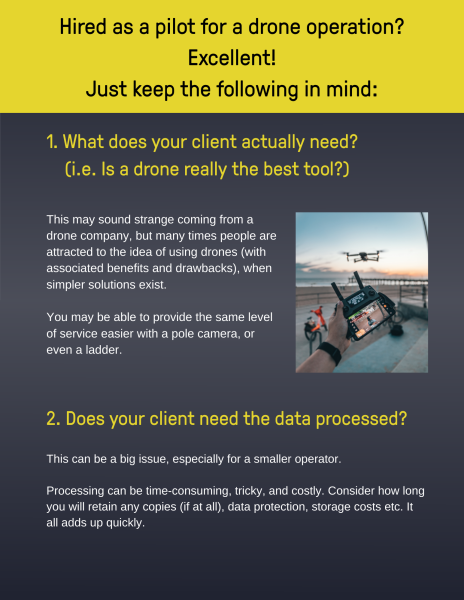
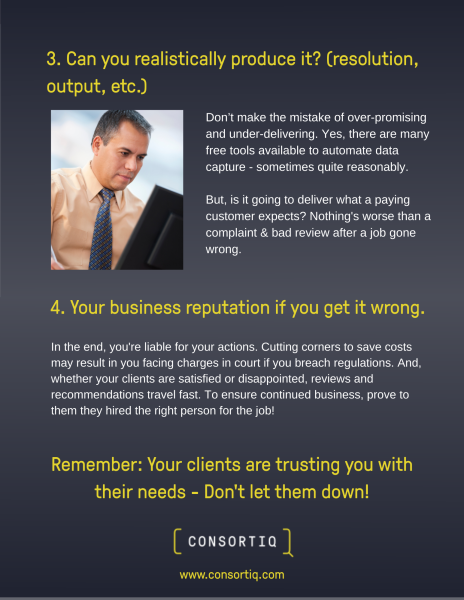
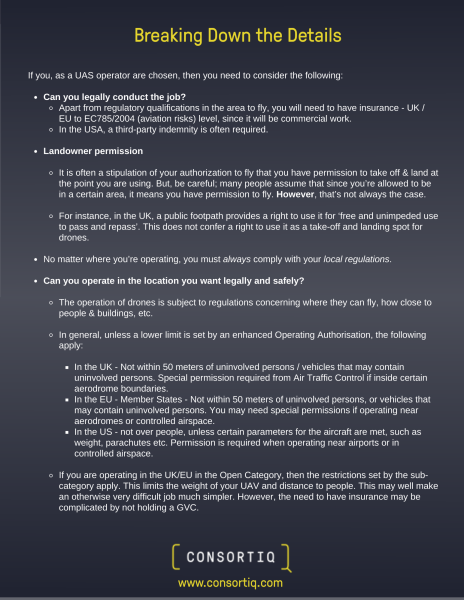
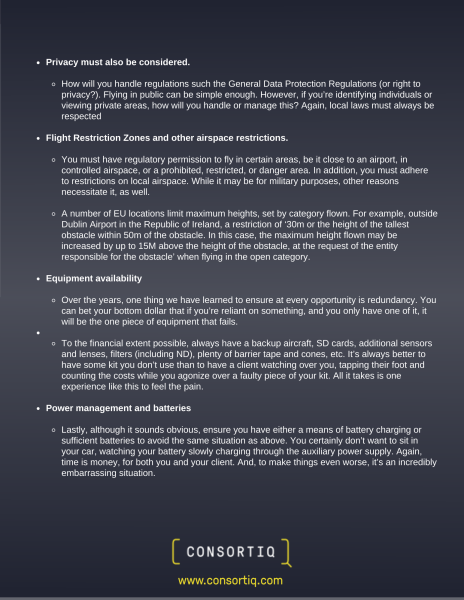
For a downloadable, printable PDF version of these slides, click here: Full PDF Version
Why You Should Specialize
Over the years, I’ve found that specializing is best. Staying focused on becoming really good at a service or two is ideal.
This focus, whether for yourself or your organization, allows you to develop the skills and experience to set you apart from your competition.
As an extra boost to your abilities, you can also look for additional training to make you more effective in providing quality products.
I now only add additional services to my toolkit when two criteria are met.
First, I verify there is a business case to support the addition of a new service. Are current clients asking me to perform that service? Are new people reaching out about it? Has new technology changed something in the business sector?
Second, I ask myself if I can become an expert provider of that service.
If I can’t answer ‘Yes’ to both of these questions, I don’t make the service available to my customers. Do I miss out on some business? Sure, I probably do. But, I avoid spending money on equipment I might never use. And, more importantly, I avoid getting in over my head on complex operations that others might better complete.
When choosing which commercial drone services you should offer to offer your clients, I’d suggest you do something similar.
Know Your Customers: Research!
Every business textbook out there will tell you to understand the market and know your customers. This is as true in the UAV industry as in any other.
By the time I became a commercial drone pilot, I’d heard this sage advice many times. I’d always followed this way of thinking in business until, one day, I didn’t.
While living in Montana for two years, I thought I’d have a go at providing precision agricultural services to the many farms and ranches in the region. I foolishly thought that because I knew how to fly my drone, I could give the farmers the information they needed and were willing to pay for.
"Always take the time to learn your customers' needs FIRST. THEN develop an understanding of how UAVs can address those needs."
-David Daly Tweet
I found that although I was a good drone pilot, I didn’t know anywhere near enough about the operations of a farm. Crop rotations, soil composition, husbandry, and the importance of nitrate levels might as well have been a foreign language.
Farms and ranchers simply had no interest in working with me because I didn’t know their business. Looking back, who could blame them?
Thankfully, I was able to recover after several trips to the local library. Since then, I don’t approach clients in new industries unless I research the industry ahead of time. Always take the time to learn your customers’ needs first. Then develop an understanding of how UAVs can address those needs.
Trust me; when choosing which commercial drone services you should offer, it’s an investment with endless returns.
Get The Right Gear For The Job – No More, No Less
Ah, yes, the ever important (and exciting!) gear, equipment, gadgets, and gizmos. You can never have too much, right?
Well, yes. Yes, you can. Especially when you’re first getting started.
In trying to offer every service under then sun, I purchased way too much gear when I first began.
This seems to happen to many UAV pilots and organizations using drones. In an effort to provide one’s customers with superior services, numerous pilots purchase equipment they’ll never use. And, while having too many SD cards or batteries isn’t necessarily a bad thing, costs can really add up.
The best example of this in my early UAV career is a $4,500 drone that wasn’t needed.
Again with the hopes of expanding into precision agriculture, I acquired a Parrot Bluegrass drone kit with a multispectral camera. This drone had everything I needed to provide farmers with reports on crop and field health. It even came with a one-year Pix4D Fields license, typically costing around $1,500.
You know what happened? To this day, I haven’t even powered it on.
If I could go back, I would have discussed getting the drone with experts in the UAV industry.
Had this been an option at the time, I’d have saved the $4,500 and used it on a drone that would better serve my business’s needs.
If you are starting drone operations, expanding the fleet, or planning to go after new opportunities, speak with experts in the field first. They can help select the gear you need and the gear you can do without.
Deciding what drone services you should offer is one of the most important decisions you’ll make as a commercial pilot.
Stay focused on the things you and your team can do exceptionally well. Learn who your customers are and understand their needs.
Finally, get the gear you need to succeed, and don’t waste money on drones or equipment you’ll likely never use.
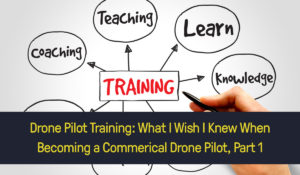
Becoming A Commercial Drone Pilot: What I Wish I Knew, Part 1 – Training
Editor’s note: This is the first article in a series: What I Wish I Knew When First Becoming a Commercial Drone Pilot. Here, pilot &
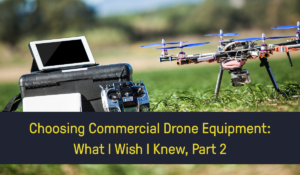
Choosing Commercial Drone Equipment: What I Wish I Knew, Part 2
Editor’s note: Choosing Commercial Drone Equipment is the second article in a series: What I Wish I Knew When First Becoming a Commercial Drone Pilot. Here,
Final Thoughts on Choosing Which Drone Services You Should Offer
The bottom line is that if you or your team are ready to start becoming commercial drone pilots, seek professional assistance.
The UAV industry has grown enough to where the school of hard knocks is no longer necessary. You’ll avoid many headaches, and help ensure a successful start to your UAV career.
—
Are you ready to begin your journey in the UAV industry? If so, Consortiq can help you take you where you need to go.
With headquarters in both the UK and US, Consortiq’s team of trusted professionals is ready to help you get started today. Just contact us using the form below and we’ll be glad to help!
Are you ready to find your better way?

David Daly - Contributing Author
David Daly, is an award-winning photographer/writer and licensed (FAA) Commercial sUAS pilot. A graduate of the United States Naval Academy, David is a former Marine Corps officer with a BS in Oceanography and has earned his MBA from the University of Redlands. David has worked for Fortune 100 companies and has a background in aerospace, construction, military/defense, real estate, and technology.

